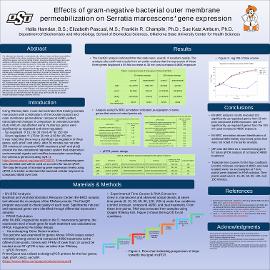| dc.contributor.author | Hamdan, Halla | |
| dc.contributor.author | Pascual, Elizabeth | |
| dc.contributor.author | Champlin, Franklin R. | |
| dc.contributor.author | Amburn, Sue Katz | |
| dc.date.accessioned | 2023-09-12T16:44:56Z | |
| dc.date.available | 2023-09-12T16:44:56Z | |
| dc.date.issued | 2022-02-18 | |
| dc.identifier | ouhd_Hamdan_effectsofgramnegativebacterial_2022 | |
| dc.identifier.citation | Hamdan, H., Pascual, E., Champlin, F. R., & Amburn, S. K. (2022, February 18). Effects of gram-negative bacterial outer membrane permeabilization on Serratia marcescens' gene expression. Poster presented at Research Days at Oklahoma State University Center for Health Sciences, Tulsa, Ok. | |
| dc.identifier.uri | https://hdl.handle.net/11244/339523 | |
| dc.description.abstract | Our laboratory has focused on understanding the effects of outer membrane permeabilizer compound 48/80 on the intrinsic resistance of gram-negative bacteria to hydrophobic antibacterial agents such as the biocide triclosan. Previously obtained RNAseq data were analyzed to identify gene expression changes potentiated by compound 48/80 in the opportunistic pathogen Serratia marcescens. These data indicated greatly upregulated expression of three genes, each involved in repair of outer membrane damage by other antimicrobial agents. The objective of the present study was to clarify the bacterial response to compound 48/80 treatment using RT-qPCR to follow gene expression, with the ultimate goal of establishing a proposed mechanism of action for compound 48/80-induced outer membrane permeability. Previous work indicated that S. marcescens is one of the few species of bacteria intrinsically resistant to triclosan, and that compound 48/80 induces transient sensitization to triclosan. The RNAseq analyses revealed a 50-fold increase in expression of slyB, phoP, and phoQ subsequent to compound 48/80 administration and qPCR primers were created in order to further investigate their regulation. The Bacterial and Viral Bioinformatics Resource Center (BV-BRC) analysis tools confirmed the upregulation of the aforementioned genes and provided Fragments Per Kilobase Million Mapped Reads (FPKM) to enable selection of an appropriate qPCR housekeeping gene, yfiR. RNA has been prepared from expression time-courses in preparation for the RTqPCR process, in which qPCR primers for slyB, phoQ, phoP and yfiR will be used to measure expression changes observed over time. | |
| dc.format | application/pdf | |
| dc.language | en_US | |
| dc.publisher | Oklahoma State University Center for Health Sciences | |
| dc.rights | The author(s) retain the copyright or have the right to deposit the item giving the Oklahoma State University Library a limited, non-exclusive right to share this material in its institutional repository. Contact Digital Resources and Discovery Services at lib-dls@okstate.edu or 405-744-9161 for the permission policy on the use, reproduction or distribution of this material. | |
| dc.title | Effects of gram-negative bacterial outer membrane permeabilization on Serratia marcescens' gene expression | |
| osu.filename | ouhd_Hamdan_effectsofgramnegativebacterial_2022.pdf | |
| dc.type.genre | Presentation | |
| dc.type.material | Text | |
| dc.subject.keywords | compound 48/80 | |
| dc.subject.keywords | Serratia marcescens | |
| dc.subject.keywords | outer membrane | |
| dc.subject.keywords | PCR primers | |
